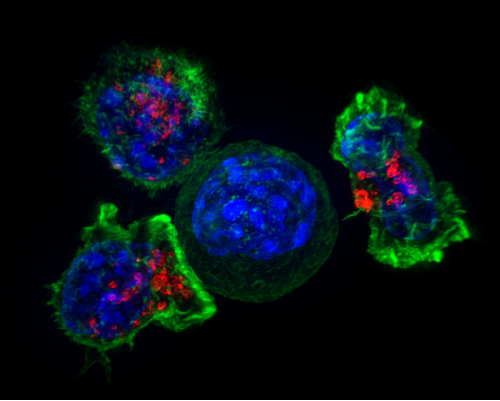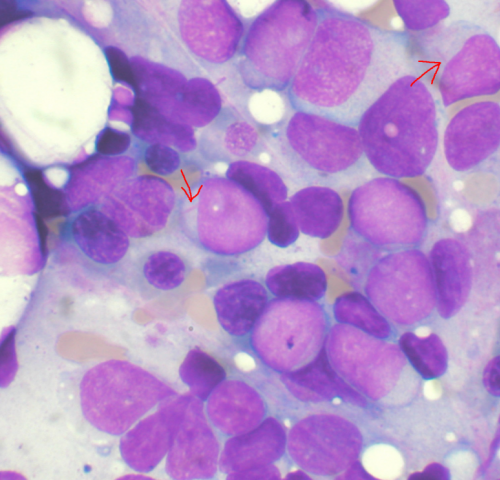by The Mount Sinai Hospital Killer T cells surround a cancer cell. Credit: NIH Mount Sinai researchers have developed a new model that uses DNA and RNA sequencing data from hundreds of patients to identify specific genes and genetic alterations responsible for never-before-defined subtypes of a blood cancer called multiple myeloma. They also identified potential targeted...
Tag: <span>Blood cancer</span>
Poor immune response in many double- vaccinated blood cancer patients
More than half of double vaccinated blood cancer patients have been left with little protection against COVID-19, new research has found. Data from the SOAP-02 trial, published today in a letter to Cancer Cell, examines the level of immune protection following the delayed Pfizer vaccine boost in 159 participants, 128 of whom were cancer patients. Although...
Researchers uncover evolutionary forces at play in the aging of the blood system and identify people at increased risk of blood cancer
Toronto – (August 17, 2021) As people age, mutations can build up in blood stem cells and their clones in a process known as age-related clonal hematopoiesis, or ARCH. ARCH can be a risk factor for acute myeloid leukemia (AML), a form of blood cancer. New research provides insight into why some with ARCH go...
Global trial reveals life saving drug for acute myeloid leukemia
by Monash University Bone marrow aspirate showing acute myeloid leukemia. Several blasts have Auer rods. Credit: Wikipedia A landmark paper published today in the New England Journal of Medicine describes the results from a global trial across 148 sites in 23 countries, showing a 30 percent improvement in survival in patients with acute myeloid leukemia (AML). The Phase...
Blood marker may reduce cancer burden
Researchers at Flinders University are expanding work on a promising blood test model to help predict or diagnose head and neck cancer, a difficult cancer to pick up early and treat. With cancer accounting for almost 10 million a year, the Global Burden of Disease report (2017) attributed more than 380,000 deaths to head and...
Cancer’s reliance on fat could be targeted with new ‘drugs and diet’ treatment
BOSTON UNIVERSITY SCHOOL OF MEDICINE (Boston)–In an effort to improve the survival of patients with myeloproliferative neoplasms, a type of leukemia, researchers inhibited a specific protein (alpha5beta1 integrin) to decrease the number of large bone marrow cells (megakaryocytes) in an experimental model. An increase in megakaryocyte numbers is thought to be the cause of many...
Targeting stem cells that drive aggressive blood cancer
by Peter MacCallum Cancer Centre Peter Mac scientists have found a way to target acute myeloid leukemia (AML) at its source—a discovery that could yield a more effective treatment for this aggressive and often incurable blood cancer. Prof Mark Dawson and Dr. Laura MacPherson led the international research team, in collaboration with researchers in Europe...
First-ever US clinical trial of engineered iPSC-derived cell therapy for blood cancer
by University of Minnesota Medical School A new cancer clinical trial has opened at the M Health Fairview University of Minnesota Medical Center that leverages the groundbreaking research on stem cells and natural killer (NK) cells done at the Masonic Cancer Center and applies it to attack acute myeloid leukemia (AML) and B-cell lymphoma. The...
First CAR T cell therapy targeting B cell-activating factor receptor eradicates blood cancers
City of Hope’s research on the new CAR T, published in Science Translational Medicine, offers hope for patients who have relapsed after commercially available CD19 immunotherapy treatments CITY OF HOPE DUARTE, Calif. — The first CAR T cell therapy targeting the B cell-activating factor receptor on cancerous cells eradicated CD19-targeted therapy-resistant human leukemia and lymphoma...
Scientists prove low cost arthritis drug can effectively treat blood cancer sufferers
by University of Sheffield A simple arthritis drug could be an effective, low cost solution to treat patients with blood cancers such as polycythemia vera (PV) and essential thrombocythemia (ET), a breakthrough study by the University of Sheffield has shown. Led by Dr. Martin Zeidler, from the University of Sheffield’s Department of Biomedical Science and...


